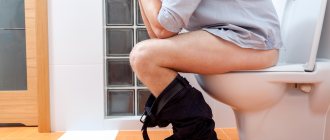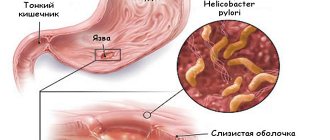Composition and pharmacological properties
The main and only active ingredient in De-Nol is colloidal bismuth subcitrate.
This substance has essential properties that help it be successfully used in the treatment of ulcers. Thanks to its film-forming effect, De-Nol protects the injured mucous membrane of the digestive tract from the aggressive effects of acids and enzymes. By causing increased local production of prostaglandins, the drug helps reduce the acidity of food juice, which makes it less aggressive and traumatic.
The medicine has a bactericidal effect against Helicobacter pylor, which is a provoking factor for ulcers.
Bleeding and feces
During exacerbations of chronic diseases of the gastrointestinal tract, internal bleeding may develop. This is an important point for differential diagnosis, since bleeding from the upper parts of the digestive tube is accompanied by the release of tarry stool (melena).
Therefore, treatment may make it difficult to diagnose the complication in a timely manner due to the same symptom – black stool. The patient must listen to his condition. Vomiting “coffee grounds”, pale skin, increased heart rate and severe weakness are sure symptoms of blood loss. If they occur, it is necessary to call an ambulance team.
How to distinguish exacerbation of gastritis from other pathologies, read here...
Information! Even if the bleeding has been stopped, the black color may persist for several more days!
Why might the stool be black?
But let's return to bismuth derivatives and try to find out why De-Nol's stool is black. In fact, during therapy with De-Nol, stool may turn not only black. Dark brown and greenish tints may be present. It depends on the body's reaction. Once in the stomach, bismuth subcitrate combines with other substances and forms a new, completely harmless component - bismuth sulfide. This is what turns the excrement black.
However, it is very important to understand that De-Nol is not the only one that turns stools black. Eating certain foods, berries, and fruits (such as mulberries) can also cause dark-colored stool.
Blood impurities, in the following diseases, create the effect of black stool:
- neoplasms in the rectal area;
- ulcerative colitis, nonspecific type;
- proctitis;
- Crohn's disease;
- vascular pathologies of the gastrointestinal tract;
- severe liver dysfunction.
If the stool turns black without using medications containing iron and bismuth, you should consult a doctor for advice and undergo an appropriate examination.
Why does De-Nol turn stool black?
The drug enters into chemical reactions in the acidic environment of the stomach. Bismuth subcitrate, as a result of interactions with other inorganic compounds, turns into bismuth sulfide. This harmless substance gives excrement a black color, which is a side effect of using De-Nol in both adults and children. Apart from changing the color of stool, bismuth sulfide does not cause other negative reactions. Different shades of stool (green, dark brown) occur with the simultaneous use of certain foods or other medications (for example, Pilobact), which change the color of stool.
Is black stool a reason to discontinue the drug?
In the official instructions included with each package of De-Nol, black feces are noted as one of the side effects. It is further indicated that if it occurs, discontinuation of the drug or adjustment of the dose taken is not required.
If the color of the stool changes after taking bismuth, therapy is continued in the same volume. This is possible if bowel functions are not impaired and the patient recovers normally (no constipation or diarrhea).
You need to know that the color of stool changes even with short-term treatment with drugs that include bismuth compounds.
If the medicine is taken uncontrolled for a long time during lactation, the baby's feces also change color.
During course therapy, when De-Nol is prescribed for a long period of time, a gray or black coating appears on the tongue. This is also a temporary phenomenon that disappears after treatment ends.
If black stool appears while taking De-Nol, it is recommended to pay attention to the general condition. The reason for the change in the color of feces due to increased pain and malaise may not be related to drug therapy.
It is necessary to exclude gastrointestinal bleeding, which is accompanied by:
- severe weakness
- dizziness,
- unmotivated fatigue,
- increased stomach pain,
- significant reduction in blood pressure.
Bleeding aggravates the course of the underlying disease. In such cases, there is no connection with taking De-Nol.
Any deterioration in health is a reason to consult a doctor. In order not to miss a dangerous complication, you need to visit a doctor in a timely manner.
Side effects
Despite the fact that De-Nol is well tolerated by patients, sometimes side effects may occur, which manifest themselves as follows:
- The color of stool when using the drug De-Nol becomes black or dark.
- there is a feeling of nausea or vomiting;
- constipation or frequent urge to defecate develops;
- allergic reactions in the form of rash reactions and itching.
Most often, these manifestations are not dangerous and disappear after cessation of therapy . However, in any situation, they should be reported to your doctor.
A fairly large number of patients after De-Nol have black stool, which is a normal reaction and does not require any treatment. However, it is very important to find out whether it is the staining of feces with bismuth sulfide in black color or inclusions of blood. Since such effects may signal serious bleeding or other pathologies of the digestive system.
Darkening of stool after De-nol
De-nol is prescribed to patients with chronic forms of gastritis or gastric and duodenal ulcers.
It has the properties of creating protective mucus on the internal gastric walls, preventing hydrochloric acid from reaching the affected areas; reduce pepsin activity; bind bile salts.
The drug envelops the mucous membrane, relieves inflammation, and has an antiseptic and astringent effect.
To prescribe a medicine there must be serious indications; it is not used during an attack of acute gastritis, in case of poisoning and stomach pain of unknown origin.
Diseases for which the use of De-nol is indicated:
- Chronic erosive and hyperacid (with high acidity) gastritis.
- Ulcer of the stomach and duodenum.
- GERD (gastroesophageal reflux disease), reflux - esophagitis.
- Irritable bowel syndrome.
- Diarrhea that does not stop for a long time.
- Dyspepsia.
- Zollinger-Elliston syndrome (a combination of a stomach ulcer with a benign tumor in the pancreas).
The drug belongs to a non-toxic group of drugs, is well tolerated, has a minimum of contraindications and side effects, but is therapeutic, requiring indications for prescription.
The active substance of De-nol is bismuth, which is a heavy metal and in large quantities can cause severe poisoning.
In a therapeutic dose it is not dangerous and is included in many products - analogues of De-nol. It is bismuth that is responsible for one of the few side effects of the drug – black feces.
Overdose
Long-term use of De-Nol in high dosages can lead to the development of encephalopathies, which are associated with the accumulation of bismuth derivatives in the central nervous system.
If the maximum therapeutic dose is exceeded, renal dysfunction may occur, including renal failure (the effects are reversible).
For treatment, it is necessary to rinse the stomach, take absorbents and laxatives. In case of severe renal impairment, hemodialysis is performed.
Who is contraindicated for De-Nol?
Whether there is black feces after consuming De-Nol is now clear to everyone. It remains to be understood in what situations taking the drug is prohibited.
So, the drug is contraindicated:
- those suffering from sensitivity to the drug and its varieties, certain components contained in the drug;
- for liver diseases;
- women during pregnancy;
- during lactation.
Dosage and treatment regimen
De-Nol should be taken orally, 30 minutes before meals.
Patients over 14 years of age are prescribed 1 tablet 4 times a day. An alternative option is 2 tablets twice a day.
Children from 8 to 4 years old should take 1 De-Nol tablet twice a day.
Children from 4 to 8 years old take the medicine at the rate of 8 mg per 1 kg of weight per day. This amount should be divided into two doses. The maximum daily dose is no more than 2 tablets.
The duration of therapy should not exceed a period of 2 months. Most often, the course lasts from 4 to 6 weeks.
To treat pathologies arising under the influence of Helicobacter, complex therapy is carried out together with Omez, Tetricycline and Metronidazole.
Is it possible to have black stools after treatment with De-Nol?
Stool staining black is a common occurrence during treatment with De-Nol. Such a change in the body causes anxiety in the patient, although it is the norm and, as a rule, does not have serious consequences. However, it would be a good idea to consult a doctor: there are a number of reasons for this phenomenon, some of which can be very dangerous to health.
De-Nol has anti-inflammatory, antimicrobial and enveloping properties. It contains bismuth dicitrate as part of tripotassium, an astringent substance that covers the affected gastric mucosa with a thin layer.
The drug is used to treat gastric ulcers, chronic gastritis, and inflammatory bowel pathologies. Prohibited in children.
Read more about De-nol analogues.
Change in stool color during treatment
In most patients treated with De-Nol, the color of the stool becomes black, dark brown or green, depending on the body's reaction to the drug. This symptom occurs in almost every second person.
The reason for the change lies in the composition of the medicine: when it enters the body, a specific compound is formed - bismuth sulfide, which gives color to the feces, including black.
Side effect features:
- feces become black during therapy, after the end of the course it returns to normal;
- the reaction is not a reason to discontinue the medication;
- a change in color to dark green is possible when taking De-Nol with Pilobact at the same time;
- Often the appearance of black feces is combined with darkening of the tongue.
Fact! There are many drugs whose side effect is a change in the tone of stool. This is a normal phenomenon that is often observed after treatment with products containing iron (Ferrum Lek, Aktiferrin, Elevit).
One of the contraindications for De-Nol is breastfeeding, so lactation should be stopped for a while. Breastfeeding women who, despite the ban, take the medicine, experience dark discharge from the breast, and the baby’s stool becomes darker.
We recommend reading:
Black feces with gastritis
The appearance of black or tarry stool may also indicate internal bleeding from the stomach. This is a dangerous complication most often of the erosive form of chronic gastritis. As a result of prolonged inflammation, small and shallow defects appear on the gastric mucosa - erosions, which are prone to bleeding.
The development of bleeding can be provoked by a sharp increase in the acidity of gastric juice, pathology of the blood coagulation system, and consumption of alcohol or rough food against the background of illness.
In addition to black stool, the patient may experience other symptoms:
- pallor, increased fatigue and weakness;
- vomiting "coffee grounds";
- decreased blood pressure, increased heart rate;
- pain in the stomach;
- nausea, fainting.
If such symptoms appear, it is recommended to call an ambulance team, which will stabilize the patient’s condition and hospitalize him in the surgical or gastroenterological department.
During the treatment of exacerbation of chronic, especially erosive, gastritis, it is prohibited to take aspirin and other NSAIDs (ibuprofen, nimesulide) orally unless absolutely necessary.
Their use can worsen the condition and cause bleeding.
Bleeding and feces
During exacerbations of chronic diseases of the gastrointestinal tract, internal bleeding may develop. This is an important point for differential diagnosis, since bleeding from the upper parts of the digestive tube is accompanied by the release of tarry stool (melena).
Therefore, treatment may make it difficult to diagnose the complication in a timely manner due to the same symptom – black stool. The patient must listen to his condition. Vomiting “coffee grounds”, pale skin, increased heart rate and severe weakness are sure symptoms of blood loss. If they occur, it is necessary to call an ambulance team.
How to distinguish exacerbation of gastritis from other pathologies, read here...
Information! Even if the bleeding has been stopped, the black color may persist for several more days!
Other side effects of the drug
Some of them are completely harmless, for example, a change in the color of stool or tongue. But there are also those that cause discomfort to the patient: vomiting, nausea, dizziness.
Other side effects of the antiulcer drug:
- allergic reactions in the form of rash, skin itching;
- loss of appetite, nausea, heartburn;
- headaches, dizziness;
- constipation;
- encephalopathy.
Find out about the side effects of the drug Omez from this article...
If you suspect any disease of the stomach or duodenum, you should consult a doctor to conduct an examination and make sure that everything is in order.
De-Nol turns the stool black, but it is an effective drug for treating stomach ulcers. If it is not suitable for a person, then you can choose another remedy that will be more easily accepted by the body.
In any case, after the appearance of black feces, you should consult a doctor to exclude the development of complications. Before you go to a specialist, you need to make a list of foods consumed before stool changes.
Source: https://lechigastrit.ru/lekarstvennye-sredstva/de-nol-chernyj-stul.html
Features of use
Taking De-Nol in excess of the maximum dosage can cause renal dysfunction, including the development of renal failure, so it is very important to follow the treatment regimen prescribed by your doctor. The duration of therapy should not exceed 2 months. Prescribing a repeat course is possible only after a certain period of time without using the medication.
Black-green stool from the drug De-Nol is a common manifestation and does not require any measures. However, it is necessary to distinguish between staining of stool black and darkening of the stool as a result of blood secretions entering it.
Concomitant use with dairy products or medications may reduce the effectiveness of the drug. De-Nol should be taken separately from other medications and products, and the period between doses should be at least an hour.
The drug should not be used in the treatment of pregnant patients. If the medication is prescribed during lactation, it is necessary to interrupt breastfeeding during the course of treatment.
Before starting to use the medication, you must ensure that the patient has no contraindications. Otherwise, therapy may cause severe complications.
Other side effects from taking De-nol
Darkened tongue and stool are the most harmless side effects of the drug. Infrequently, bismuth-based products provoke other, more dangerous reactions of the body.
If you take the drug for a long time and in large doses, bismuth accumulated in the brain tissue can cause encephalopathy, requiring urgent withdrawal.
A significant increase in the permissible intake rate (more than 10 times) impairs kidney function. For severe disorders, hemodialysis is indicated; milder ones are treated with the use of enterosorbents.
From the gastrointestinal tract, temporary disorders are possible: stool changes (constipation or diarrhea), nausea and vomiting appear.
There are dermatological reactions - urticaria, itching and rash on the skin. Memory and attention disorders are rarely observed.
Any discomfort during treatment should not be ignored, since each body is individual and may react differently to the components of medications.
If you have the slightest doubt about the safety of the prescribed therapy, do not delay visiting a specialist.
The doctor will make the necessary adjustments to the dosage and course of medication or, if necessary, prescribe another drug.
De-nol is one of the newest gastroprotective agents successfully used in the treatment of ulcers and gastritis, and such minor inconveniences as changes in the color of stool should not be a reason to refuse effective help to the body.
The article is not intended for self-diagnosis and self-medication. For any questions related to your health, you should consult a specialist.











